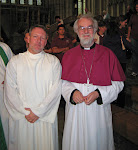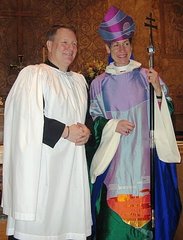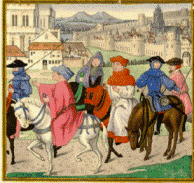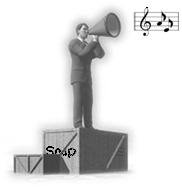Preached on the fourth Sunday of Lent, March 2, 2008 at St. James Episcopal Church Fordham Manor. Scripture readings this sermon is based on can be found here.
A few weeks ago in our Lenten cycle of readings, Abraham set out from Haran to the Land of Canaan. Last week was all about water; Moses brought water from the rock at Meribah and Massah, and Jesus gave the woman at the well living water that would quench her spiritual thirst for ever.
This week, in our readings, we are talking about seeing, about being chosen and sent out to do God’s work in the world. Today we hear a bit about fear, and about faith in God’s plan for our lives and our world.
As our reading today begins, Samuel is pretty downtrodden over King Saul’s failure as the first king of Israel. But God tells Samuel to get over it and to get on the road. God sends Samuel to Bethlehem where he will find Jesse, and his sons, and it is from this relatively unknown and undistinguished family that God has chosen Israel’s next king.
As theologian Rick Marshall points out, Samuel and the Bethlehemites are wary. They are fearful of retaliation by a jealous Saul. This is a kingdom in decline, a fearful people fraught with anxiety. There’s been a failure of leadership, and there is fear about the future.
Samuel takes a heifer to sacrifice at Bethlehem so that Saul won’t suspect anything, and there he asks Jesse and his sons to join in his sacrificial banquet. The first of Jesse’s sons to come before Samuel is Eliab. Samuel immediately thinks, “Oh, this must be him.” Eliab is apparently tall, dark and handsome, just as Saul was. But God tells Samuel no, it is not Eliab.
And then comes one of those scripture passages that ring down the ages, one of those verses that helps us in our own day understand ourselves and God, and what God’s values are, as opposed to our own. First Samuel, chapter 16, verse 7 says, “For the Lord does not see as mortals see; they look on the outward appearance, but the Lord looks on the heart.”
Samuel looks for the most photogenic of Jesse’s sons to be God’s obvious choice. But God is not quite so obvious as that. As all of Jesse’s sons pass before him, God tells Samuel that all of these have been rejected. Samuel has to ask Jesse, “Is this all of them?” That’s when we find out that the youngest, the runt of the litter, is out in the fields tending the sheep. He is sent for, and when this youngest son appears, Samuel notices right away, that he too is handsome, but in a ruddy, hardworking kind of way, not at all like Saul and Eliab.
God tells Samuel, “Rise and anoint him for this is the one.” Samuel
 does so, and it is not until just this point in the story, after 13 verses and 7 older brothers, that the scripture finally reveals the identity of this new king. “The Lord came mightily upon David from that day forward.” Ah, yes. David, the fabled king of the united nations of Israel and Judah. This unexpected, youngest son of the obscure Jesse, this shepherd boy, is the one chosen by God to lead the people; he is the one Samuel has been sent to find.
does so, and it is not until just this point in the story, after 13 verses and 7 older brothers, that the scripture finally reveals the identity of this new king. “The Lord came mightily upon David from that day forward.” Ah, yes. David, the fabled king of the united nations of Israel and Judah. This unexpected, youngest son of the obscure Jesse, this shepherd boy, is the one chosen by God to lead the people; he is the one Samuel has been sent to find.Samuel needed to look with the eyes of God on Jesse’s sons before he could really see the one God had chosen. And it is God who has seen David, has looked into his heart. In the very first verse of the reading, God says to Samuel, “I have provided for myself a king” from among the sons of Jesse. The word that we translate as ‘provided’ is actually a form of the verb “ra’ a” meaning literally ‘to see’ in Hebrew. God is telling Samuel that he has seen among Jesse’s sons the one that will become Israel’s legendary yet flawed king.
And this is a beginning of a long, complicated and beautiful love story. The love story of God for David, and of David for his God. You can hear its beginnings in the description of David’s rough beauty. God sees David’s good points and bad. God loves him totally, and God anoints David to do his work in the world. David’s failings do not prevent him from being chosen to lead, and they do not prevent God from loving David unconditionally. And this unconditional love affair will David’s own life and be translated down the generations to David’s eventual heir, Jesus -- and by our baptism into the very body of Christ, unto us.
+++++++++++++++
In our gospel reading, seeing and being sent figure prominently as well. Jesus sends the man born blind to wash in the pool of Siloam which means ‘sent’ and gives him the gift of sight. The man born blind is then able to bear witness to God’s grace in his life, though neither his neighbors, nor the religious authorities thank him for it.
And then there is God’s truth that in some ways justifies all the anxiety. God has a new plan. God is doing a new thing. God is calling new leaders. God is sending his people out to do his work. David -- and then Jesus -- have been chosen, and sent by God to refocus and recreate the relationship between God and humanity. David will serve as proof of God’s unending love for us. And Jesus will prove that God’s love for us extends through the love God bears for the only begotten son. Jesus’ death and resurrection will show the world that God’s plans for us extend beyond the grave, and unto everlasting life.
+++
I think that each of us here this morning can find our own stories in the scriptures we have read this Lent. Many of us like Abraham have journeyed away from our homes -- in search of what might be God’s will for us, God’s plan for our lives. We have traveled from the West Indies and from West Africa, even from West Tennessee. We have, some of us, come like Samuel, seeking new opportunities in places of peace, free from strife and the anxiety of life in unsettled political situations. And we have all found our way to St. James where we bear our own witness to God’s grace in our lives -- and where later this morning at our Annual Meeting we will choose new leaders to guide our parish into the future.
I too was sent to St. James. I came here to learn about parish ministry from Fr. Haller, Br. James, Mr. Green, Ms. Stewart -- from all of you. And soon, I will be sent somewhere else, to shepherd God’s children in another place. Like the man born blind, I have tried to bear witness to God’s grace in preaching from this pulpit and in serving near this altar. Like David, I am the least likely to be called, and yet called I am.
Through my duties here, I have been challenged to make Christ and his redemptive love known. I have learned something about the needs, and concerns of this community and our hopes for the world. I have had the chance to assist in public worship and in the preaching of God’s word, and the ministration of the Sacraments. Each of these is the particular duty of a deacon.
Like Samuel, you have seen me in this new role: at the altar, at the communion rail, in this pulpit -- at coffee hour, in bible study and at parish meetings. And by seeing me in these various roles, you have helped me see myself as a minister to God’s people. You have been minister to me. Yyou have helped me see as God sees. You have helped me to see into my own heart.

This is an anxious time for me. My ordination as a deacon will be two weeks from yesterday, on March 15th at 10:30 in the morning in our Cathedral Church of St. John the Divine. I hope as many of you as can be there will be there. It will be a celebration of your ministry to me as much as an ordination of my ministry.
God is doing a new thing in my life. And yet I am anxious. I haven’t had a good night’s sleep in a couple of weeks now. I’m forgetful of assignments at school and appointments with friends.
Perhaps you know how I feel. You know the anxieties of raising children, working for the best life that you can provide for them. You anoint them with your love, and then let them go to make their own mistakes and triumphs. You know the anxieties of life in our time -- economic fears, fears of violence around the world and here at home. And yet, in the face of these anxieties, we can all be sure of two things. God loves us unconditionally, and God has called each of us. Perhaps it is our sensitivity to the anxieties around us that testifies to the fact that God is calling us to lives of mission, and of service to God and God’s people.
It is clear to me that God has called you to be like Samuel to me, to help me come to understand my duties as a deacon, and one day as a priest. You are called like Samuel to anoint new parish leaders at today’s election. Perhaps some of you will be called as I am to ordained ministry. Someone among you may be the next Barak Obama or Hillary Clinton, chosen like David to lead a great nation. Some of you may be sent, like the man born blind, to bear witness to -- and in fact to administer -- God’s miraculous power to heal.
There is no doubt that there is anxiety in our lives. And there is no doubt that God sees the way forward. And that if we can look into our own hearts and into the hearts of one another, we too will see what God sees. We can come to perceive God’s will for ourselves and for the world. And with God’s grace and with the support of one another, we can do what God calls us to do. We can serve God’s people in whatever ways we are called. We can do justice and love mercy. We can be prophets and priests, and faithful members of the Bishop’s Committee. We can make Christ’s redemptive love known. We can bear witness to the needs, hopes and concerns of our communities and of the world. We can give glory to God in all that we do.
During this Lent, I encourage you all to look within, to see your own role in God’s plan for the salvation of the world, and to take heed of God’s call in your own lives -- and in your own hearts.
Let us pray:
O God, you anointed your servant David to become the shepherd of your people. Prepare our hearts and minds and spirits to do the work you have given us to do. Open our eyes to see within ourselves and others the challenges you call us to, and the gifts you have given us to meet those challenges. Grant us the wisdom to discern your call to us, and the courage to heed it. Amen.







2 comments:
Hey! Looks like the taping worked out o.k.!
Yes! Got it working after an hours-long upload to Google Video! Next time: lower quality video means faster upload time!
Post a Comment